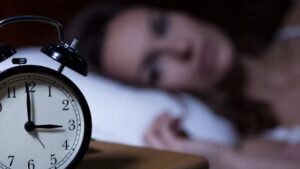Mental Health and Sleep
Disclosure: By clicking on the product links in this article, Mattress Nerd may receive a commission fee at no cost to you, the reader. Read full disclosure statement.
Mattress Nerd consulted licensed clinical psychologist, Dr. Holly Schiff, PsyD, to ensure that this article met our editorial standards.
Mental health disorders have historically been linked to sleep problems — anxiety can cause disturbing thoughts that prevent you from falling asleep; depression can lead to oversleeping; nightmares triggered by post-traumatic stress disorder (PTSD) can fracture a night’s sleep. But studies show that inadequate sleep can significantly increase the risk and severity of mental distress, suggesting that sleep and mental health have a reciprocal relationship.
Sleep is a highly restorative ritual for our bodies, and especially our minds. When we get a full night’s sleep, our brains have the opportunity to process and create memories, the sympathetic nervous system (the one responsible for the fight or flight response) chills out, hormones rush to repair tissue and muscles, and we wake with more mental acuity, which fosters creativity, reasoning and problem solving. We’re also more equipped to manage stress, anxiety, and depression.
When our sleep is disrupted and we are deprived of adequate sleep, our mental health suffers. “Sleep deprivation and unregulated hormones can cause an individual to be more sensitive to emotional triggers, provoking mental disorders,” leading to a seemingly never-ending cycle, says Amerisleep’s Spencer Institute Certified Sleep Science Coach McKenzie Hyde.
“Having mental health issues such as anxiety and depression can keep you awake all night and make it difficult for a person to catch up on some much-needed shut-eye,” adds Girish Dutt Shukla, author and mental health advocate. But getting a good night’s sleep isn’t a hopeless situation for those who deal with mental disorders.
By understanding the correlation between inadequate sleep and mental distress, we can begin to find ways to improve sleep and lessen the risk or severity of mental health symptoms which, in turn, can help improve sleep.
How does sleep affect mental health
A normal sleep cycle involves four stages of increasingly deep sleep during which body temperature drops, muscles relax, and heart rate and breathing slow down. During the deepest stage of sleep physiological changes occur that help boost our immune system.
Another sleep category involves REM (rapid eye movement) sleep, which is when we dream. During this time, body temperature, blood pressure, heart rate, and breathing increase to the level similar to when we are awake. It is during this phase that memory and emotional health are strengthened.
Uninterrupted REM sleep allows our bodies and brains to relax and be restored. Our brains are able to positively process memories, enabling better thinking and decision making. Research published in the Psychological Bulletin Journal also shows that getting plenty of REM sleep helps us better regulate our emotions.
Deprived of adequate sleep, our brains are not just foggy, they’re less equipped to manage emotions, which may explain why sleep deprivation is also associated with an increased risk of suicidal ideation and behaviors.
Severe sleep problems can also decrease the effectiveness of some treatments, according to the National Alliance on Mental Illness (NAMI), further exacerbating the link between sleep and mental health.
How mental health conditions affect sleep
How mental health affects sleep often depends on the type of disorder someone is experiencing:
Depression
Depression is a common and serious mental illness associated with an intense and persistent feeling of sadness, hopelessness, and loss of interest. Studies suggest that between 65 to 90 percent of adults with depression and up to 90 percent of children with the disorder experience some type of sleep problem. Depression is associated with insomnia — difficulty falling asleep, waking up during the night, or waking very early in the morning. People with depression may also spend more time sleeping, finding it difficult to get out of bed and face the day.
ADHD
Attention deficit hyperactivity disorder, or ADHD, is associated with symptoms such as inability to focus, difficulty sitting still, and impulsivity in decision making. ADHD is more often diagnosed in children but can also affect adults. Many of the treatments used to treat ADHD are stimulants, which are effective at providing mental clarity and focus. While beneficial at school or work, these medications can make it difficult to fall asleep or stay asleep. According to some studies, 25 to 50 percent of people with ADHD experience sleep problems ranging from insomnia to nightmares to sleep disorders.
Anxiety
Anxiety disorders are the most common mental illness in the United States, affecting upwards of 40 million adults. Anxiety is an umbrella term that encompasses conditions such as generalized anxiety disorder, phobias, obsessive compulsive disorder, panic attacks, and more. People with anxiety often worry excessively, which can worsen at night and contribute to insomnia and sleep-fracturing nightmares.
PTSD
Post-traumatic stress disorder, or PTSD, is a psychiatric disorder that can occur in people who experience or witness a traumatic event. Those who suffer from PTSD continually relive the fear and trauma of the experience, which results in intense emotional anxiety. Studies show that between 70 and 90 percent of adults with PTSD suffer from insomnia and up to 71 percent report having nightmares. PTSD has been shown to interfere with the sleep process by increasing light sleep; decreasing restorative deep sleep; and interfering with REM sleep (the sleep stage in which dreaming and nightmares occur). People diagnosed with PTSD are also three times more likely to self-medicate with alcohol or drugs and, as a result, are 14 times more likely to be diagnosed with substance use disorder.
Substance Use Disorder
Substance use disorder, also referred to as SUD, is a mental disorder that affects a person’s brain and behavior. SUD is associated with substances such as alcohol, opioids, stimulants, and depressants. According to research published in the journal Psychiatry, people with substance abuse disorders are 5 to 10 times more likely to have trouble sleeping. Coincidentally, many people who develop SUD are also diagnosed with a mental disorder, and vice versa.
Psychosis
Psychosis is a mental illness like schizophrenia or schizoaffective disorder characterized by a disconnection from reality. Sleep disturbances are known to be associated with psychosis, with between 37 percent and 78 percent of those with the condition reporting sleep disturbances. Sleep deprivation can also trigger psychotic episodes such as mania, psychosis, or paranoia. Even people who do not suffer from psychosis can experience psychotic symptoms such as hallucinations and delusions if they are severely sleep deprived.
Tips to improve sleep and mental health
Mental health problems can make getting a good night’s sleep challenging, but not impossible. We asked mental health and sleep experts to offer their best tips on how people who suffer from mental health problems can get better sleep. Here’s what they said:
Relax: Anxiety in any form can leave you wound too tight to settle down and fall asleep at night. Try relaxation exercises about an hour or 30 minutes before bedtime. Sit quietly and focus on your breathing or concentrate on tensing and then relaxing different muscle groups.
Get outside: Sunshine strengthens your circadian rhythm, your body’s internal 14-hour clock that regulates our sleep-wake patterns. Natural daylight helps keep you awake during the day and strengthens the body’s release of the sleep hormone melatonin when it gets dark, helping you feel sleepy at night.
Reduce blue light exposure: Blue light that emits from electronic devices such as smartphones, tablets, and TVs triggers the brain to be more alert, which interferes with sleep. Help your brain turn off at night by unplugging from the electronic devices.
Set a regular sleep/wake schedule: Just as schedules help kids sleep better at night, setting a regular bedtime and wake time — even on weekends — can strengthen your circadian rhythm and help you fall asleep faster at night and wake up in the morning feeling refreshed.
Create a bedtime routine: A nighttime routine signals to your body and your brain that it’s time for bed. About 30 minutes to an hour before bedtime practice good sleep hygiene by brushing your teeth, washing your face, taking a bath, and reading a book or listening to music.
Natural sleep aids: Lavender and chamomile soaps, essential oils, and teas are associated with better sleep, as are dietary supplements such as melatonin, valerian root, and magnesium. However, be sure to talk with your doctor before taking any supplements as some may interfere with medication you are already taking.
Invest in a new mattress: A comfortable and supportive mattress can do wonders for your sleep. If your mattress is old and sagging, your sleep will suffer, too.
Talk to someone: Sometimes the best medicine is talking. Seek out a trusted friend or consider speaking to a licensed professional counselor. Dealing with the issues that cause you worry can help you cope with your issues. This, in turn, can reduce symptoms and help you sleep better.
Seek medical advice: If you are still struggling to get a good night’s rest, talk with your doctor. A doctor can rule out any medical issues, order a sleep study to investigate the possibility of a sleep disorder, or change your medication so you can sleep better.
Final Thoughts
One-third of U.S. adults sleep less than the recommended 7 to 9 hours of sleep each night and approximately 20 percent live with a mental illness, according to the Centers for Disease Control and Prevention. It’s not just a coincidence. Numerous studies have shown that mental health conditions contribute to sleep problems and poor sleep aggravates mental health symptoms.
“There is an important link between mental health and sleep patterns. Insomnia, narcolepsy, sleep apnea, and other sleeping disorders are often observed in anxious and depressed patients,” says Chave McIntosh, clinical director of ChoicePoint Health. “It still remains a mystery whether mental health disorders cause sleeping disturbances or vice versa.”
Despite this reciprocal relationship, it is possible for people who suffer from anxiety, depression, and other mental health problems to get restorative sleep. All it takes are a few lifestyle changes and you’re well on your way to a good night’s sleep.
Meet Our Medical Reviewer
Licensed Clinical Psychologist
Dr. Holly Schiff is a clinical psychologist licensed in both CT and NY. She was awarded a Doctorate of Psychology in School and Community Psychology from Hofstra University. She earned her Bachelor’s degree from Fordham University, majoring in Psychology with a minor in Sociology and Pre-Law advisory. Dr. Schiff conducts individual therapy, family therapy, parent guidance, and group therapy using Cognitive Behavioral Therapy, Dialectical Behavior Therapy, and Trauma-Focused CBT.


